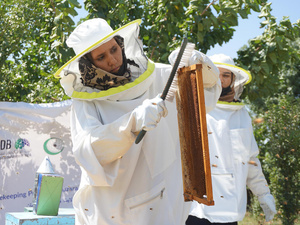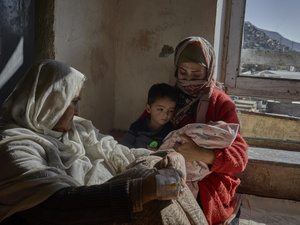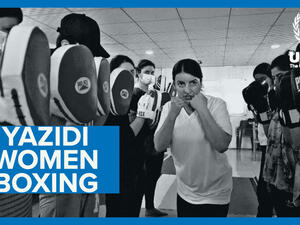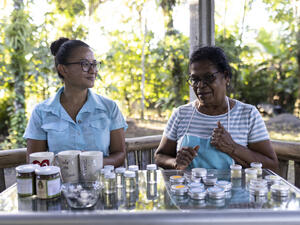Lubbers hands out awards for work with refugee women
Lubbers hands out awards for work with refugee women
UNHCR global statistics show that Afghans, shown here at a relief distribution centre outside Kabul, remain the largest group of refugees of concern to UNHCR.
Geneva, June 17 (UNHCR) - UN High Commissioner Ruud Lubbers on Monday gave awards and letters of appreciation to UNHCR staff and partners in recognition of their work with refugee women to whom this year's World Refugee Day on June 20 is dedicated.
Among the award recipients was a 26-year-old Congolese refugee, Mbela Nzuzi, who was recognised for her work in fighting xenophobia in Romania and helping the integration of the more than 2,000 refugees in that country.
Nzuzi is president of the Refugee Women's Organisation in Bucharest.
Accepting the certificate of recognition, Nzuzi said that the life of a refugee woman was not easy.
"It is not easy at all to be a refugee woman, to be a refugee. Our work helps refugees to feel at home. But our dream is to go back home," she said.
Others cited were Maria Olandina Alves-Caieiro for working with displaced people in East Timor, Julia Kharashvili who helped start peace camps for displaced children in Georgia, Ferda Cilalioglu in Turkey and the Guinean organisation, Men's Association for Gender Equality (MAGE). Lubbers also commended five UNHCR staff members for their exemplary work for refugee women.
Presenting a report on the situation of refugee women, Lubbers said UNHCR has made considerable progress to improve the lives of refugee women despite serious financial shortfalls and, in some cases, with limited resources.
Many offices are concerned that budget cuts affect women and children first, Lubbers said. "They recognise that communities are safer and more resilient to crisis when women are empowered to contribute their opinions and resources. Therefore gender equity and women's empowerment are vital to saving and protecting lives."
At the beginning of this year, the High Commissioner made five commitments aimed at better protecting refugee women. Among these was a pledge to ensure individual registration of every man and woman refugee, a commitment to increase to 50 per cent women's representation in leadership and management committees, particularly in refugee camps, and increased involvement of women in food distribution. He also pledged to ensure that sanitary supplies for women were part of standard packages alongside other domestic supplies such as plastic sheeting and kitchen utensils.
Lubbers noted that although some governments around the world still had difficulties in accepting the need for individual documentation for women and men, southern American countries had made good progress in ensuring registration of individual refugee men and women.
"For example, Mexico has been able to ensure that all women get identity cards and do not have to remain in abusive situations, as well as having greater possibilities for employment," he explained.
Reporting on women's involvement in food distribution, the refugee chief said that in some places in Asia, UNHCR's efforts to involve more women in distribution of supplies were successful only after "lengthy negotiations, as government and other officials reflected strong cultural and religious reservations." In some places, however, the agency has achieved 60 per cent involvement of refugee women.
In Africa, he said, many refugee women do participate in food distribution, but cultural practices and the overburdening of refugee women with too many tasks still present problems.
Speaking about the provision of sanitary supplies to refugee women and girls, Lubbers said it was probably the only commitment which cannot be done at all without financial resources.
"However, it is clear that allocation of resources to these important items is low because of a lack of understanding of the linkage to women's dignity and health," he explained.
UNHCR has received $ 517.6 million dollars, or just under 50 per cent, of its one billion dollar budget for its regular and special programmes. By the end of 2001, there were more than 20 million people of concern to the agency.









